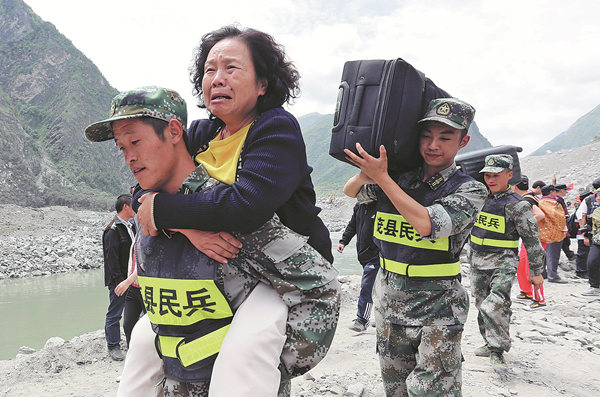
Sichuan Brigade of Armed Police officers use life detection devices to search for buried villagers of Xinmo village, Sichuan, on Sunday. PHOTOS BY FENG YONGBIN / CHINA DAILY
Peng Kaiqun had a sense of awe when recalling the landslide that left at least 93 people missing in her home county of Maoxian in the Aba Tibetan and Qiang autonomous prefecture in Sichuan province on Saturday morning.
"I had never witnessed anything so scary that I thought it was the eruption of a volcano," said the 35-year-old woman, whose Lianghuokou village is within a walking distance from Xinmo village, where the landslide took place.
At around 5:38 am on Saturday, Peng said she heard a deafening sound and saw rocks falling from the nearby Fugui Mountain. "Water, mud and rocks were flying more than five meters above ground and found their way into Xinmo at the foot of the mountain," she said.
A total of 18 million cubic meters of rock, earth and water slid from the top of the Fugui Mountain and buried 62 homes at the Xinmo village, killing at least 10 and leaving more than 93 missing, according to Xu Zhiwen, deputy chief of the Aba prefecture government, on Sunday afternoon.
On Saturday, President Xi Jinping asked relevant authorities to make maximum efforts to reduce casualties and prevent secondary disasters. Premier Li Ke¬qiang also gave instructions to the rescue work.

Family members of the missing people and those suffering losses in the disaster must be given appropriate care, according to Xi's instruction. He also ordered the State Council, China's Cabinet, to send a work team to the site.
On Sunday afternoon, more than 3,000 rescuers were searching for the missing in the debris. About 300 local residents had been relocated and received relief materials such as food, drinking water and quilts. Fourteen monitoring stations had been set up for the surveillance of geology, environment, meteorology and water resources, according to the prefecture government.


















































